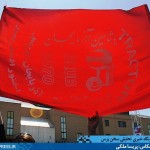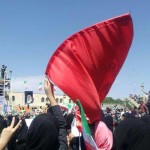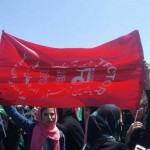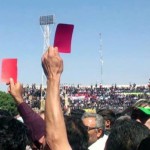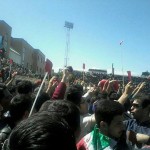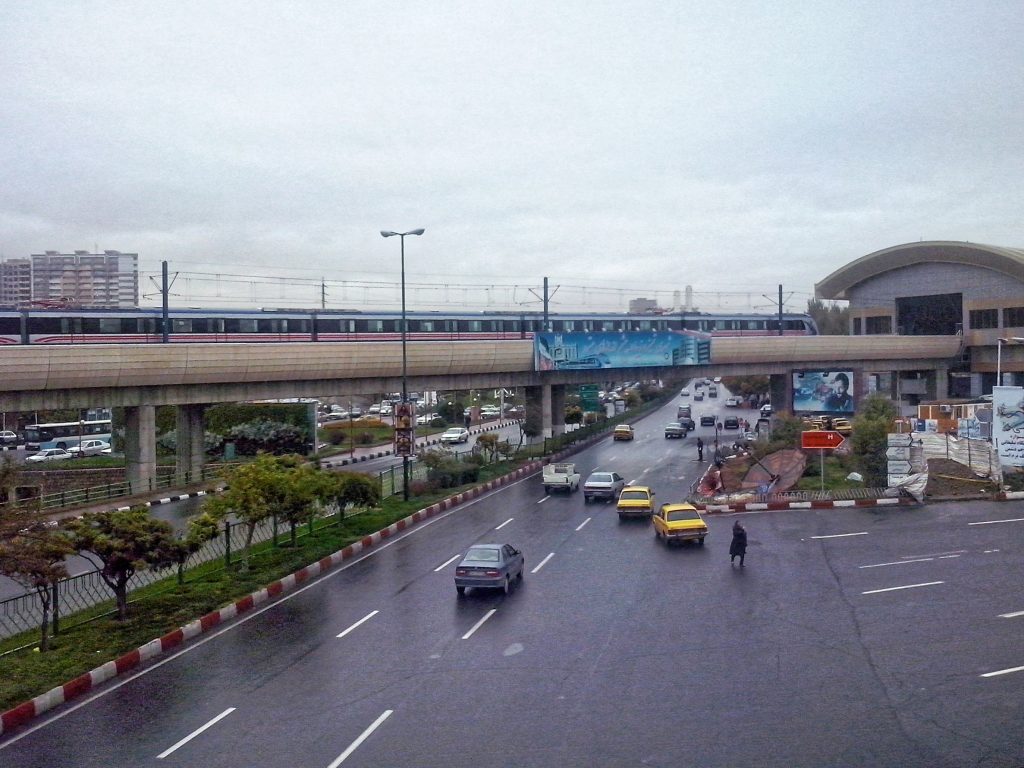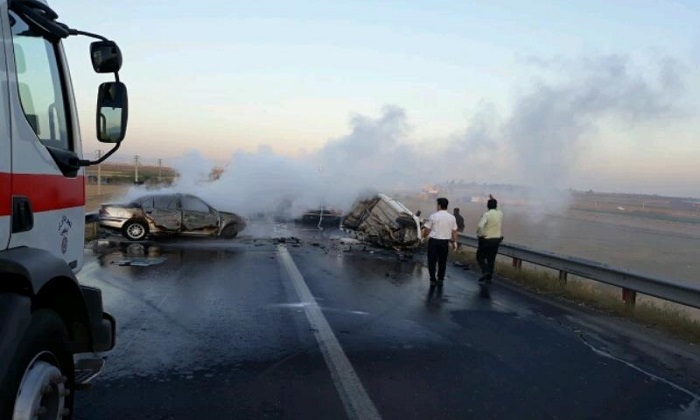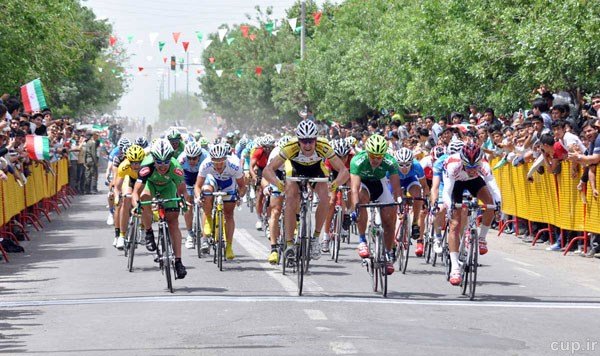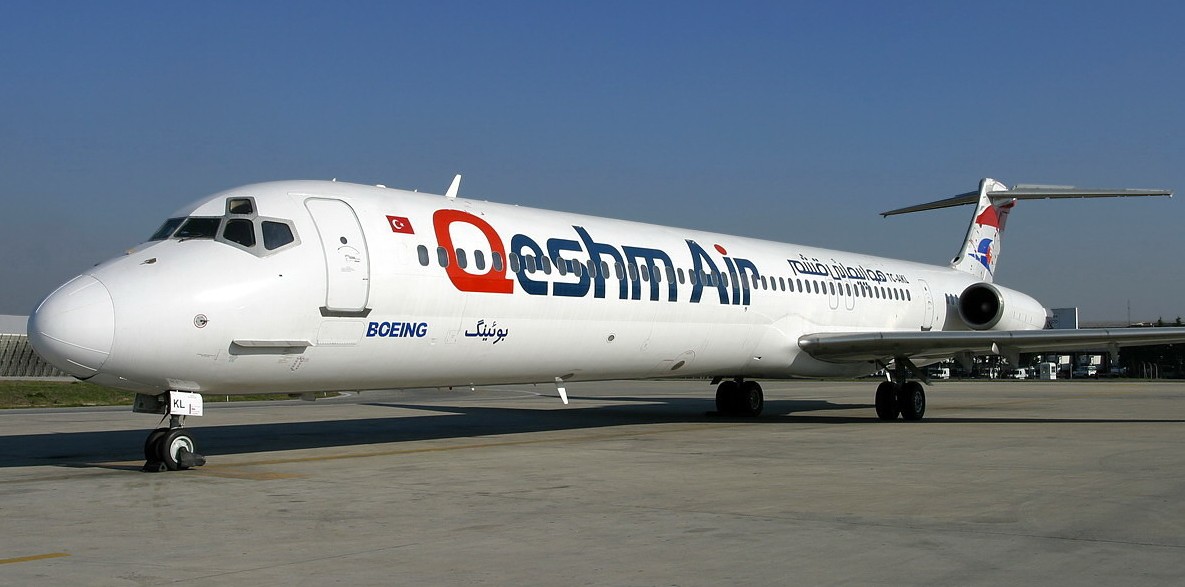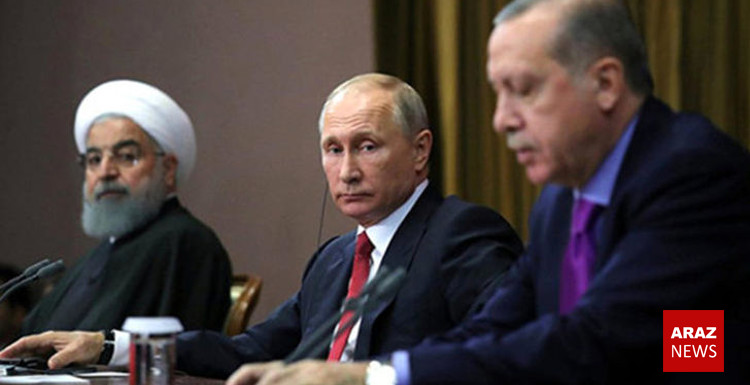Azerbaijanis remain skeptical of Rouhani’s Tabriz visit
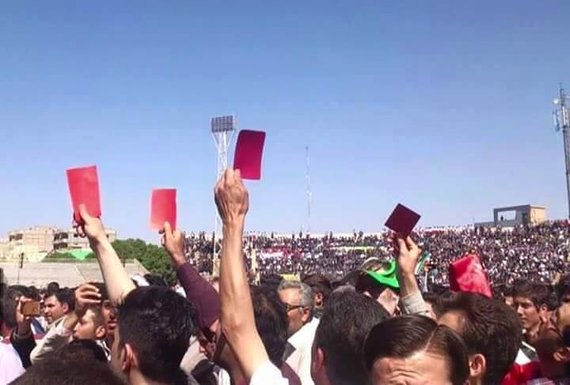
By FARZIN FARZAD
TABRIZ, South Azerbaijan
Araz News: Iranian President Hassan Rouhani was in the city of Tabriz, East Azerbaijan Province, on May 20 to garner support for the nuclear negotiations, as a predominantly ethnic Azerbaijani crowd of 40,000 gathered in Takhti Stadium to watch Rouhani speak of national unity and express his optimism that Iran was close to defeating “Iranophobia.”
Tabriz, the unofficial capital of South Azerbaijan, is Iran’s third most populous city and of key importance to the regime. The city has lately become the epicenter of growing Azerbaijani nationalism. Rouhani’s speech comes at a time when Azerbaijanis remain restive over the outcome of a football match on Friday, in which Tabriz’s local team lost the championship under suspicious circumstances.
While many Tabriz residents gathered in the stadium to catch a glimpse of the President’s speech, most were not supportive. Upon arrival in the city, Rouhani’s motorcade was met with a mass of people chanting “Tirakhtur!” the local nickname for Tabriz’s Tractor Sazi Football team.
The cries were in reference to bitter sentiments over Friday’s bout where a red card was suspiciously given to a team midfielder and premature rumors of a league victory left Tractor Sazi in second place. Tractor Sazi supporters were quick to accuse the Islamic Republic of Iran Football Federation (IRIFF) and plain-clothed government agents of foul play. Angry fans thus promised to show their own red cards to President Rouhani, prompting activists to set up the “Red Card Campaign” on social media to protest not only the results of the game but systemic racism against ethnic Azerbaijanis by Persian nationalists and the government. The advocacy campaign quickly gained a tremendous amount of support.
Prior to Rouhani’s speech, Tabriz Friday Prayer Leader Ayatollah Mojtahed Shabestari customarily took the stage to introduce the President. Pandering to the audience, Shabestari ended his speech with a popular pro-Islamic slogan in the Azerbaijani language, “Azerbaijan is awake and supports the Revolution!” The crowd responded by replacing the word “Revolution” with “Tirakhtur,” in an attempt to show that their loyalties lie with the Azerbaijani nation above the Islamic Revolution. The response left Shabestari agitated as he demanded that the crowd settle and allow him to finish his speech.
Islamic Republic leaders, who give speeches in regions of South Azerbaijan, tend to intermittently use phrases in the local Azerbaijani-Turkic language to rouse support. While many see it as patronizing, loads of culturally and linguistically-starved Turks often grasp the opportunity to speak in their own language, which is thus far banned in schools and the media. Ironically, as Shabestari spoke in Azerbaijani-Turkic, several activists in the audience could be seen holding up a banner that read “Education in our mother tongue is our right.”
When Rouhani took the podium, he was met with a sea of activists holding up makeshift red cards who continued to shout chants such as “Long Live Azerbaijan!” and “The Azerbaijani nation will not tolerate this cruelty!” Rouhani tried to calm the crowd by addressing Azerbaijani concerns over language rights, the environmental damage created by the drying of Lake Urmia, and the perceived injustice over Tractor Sazi’s loss. Rouhani also on several occasions quoted Azerbaijani-Turkci language excerpts from the poems of Azerbaijani national poet Shahriyar, playing into the nationalist fervor.
President Rouhani’s speech comes at a time of waning support for the President’s policies among Azerbaijanis. Rouhani did not address the issue of language rights during his speech, but was adamant in referring to Iran as “one nation.” Azerbaijanis thus still remain skeptical of his promises. The Rouhanimeter website, tracking the President’s campaign promises lists Assuring Equal Rights for All Iranian Ethnicities as being inactive.
Following the speech, local media reported that Rouhani met with his cabinet to discuss the issue. Backtracking on his campaign promise of allocating funding for a ‘Turkic’ Language and Cultural Academy, the President called for the establishment instead of an ‘Azeri’ Cultural, Arts, and Literature Foundation. The announcement was taken as an insult as activists complain that the term “Azeri” has slowly morphed into an ethnic slur and utilization of the term is meant to segregate Azerbaijanis from their Turkic roots. They maintain that an academy that emphasizes their ‘Turkicness’ is essential.
In addition to the language rights issue, Azerbaijanis exclaim that the IRI President’s campaign promise to restore water levels in Lake Urmia, once the Middle East’s largest salt, lake have not yet been realized.
Roughly $500 million, in addition to $135 million of additional funding from the United Nations Development Program (UNDP), was allocated by the regime for the revival of the lake for FY2015. Azerbaijanis claim, however, that results are yet to be seen. The issue was recently met with apathy in Iran’s Parliament as Urmia city’s MP Nader Gazipour claimed that so far none of the funds have been appropriately allocated.
Lake Urmia has been steadily drying for several decades, but water levels have dropped most dramatically in the past 10 years. The once vibrant lake, which has become a symbol of Azerbaijani national identity, is less than 10% the size that it once was, leaving harmful salt to be blown throughout areas of South Azerbaijan by the region’s strong winds. Reports have steadily been emerging of salt deposits destroying crops and causing health problems for the region’s inhabitants.
The Red Card Campaign received much greater support via social networks than during Rouhani’s speech. This is attributable to the atmosphere of fear created by the quick response and brutal policing tactics of Iran’s security forces. South Azerbaijan is now one of Iran’s most militarized regions as the regime fears growing separatist sentiments. After Rouhani’s speech, spectators reported that security forces attacked some of the more vocal protesters and arrested a handful of activists.
Tractor Sazi FC has also become a symbol of Azerbaijani national identity and matches serve as convenient locations to gather in order to demand ethnic rights. The team’s ties to the Azerbaijani National Movement cannot easily be severed. It has become worrisome for the regime, so much so that some say it prompted the Islamic Republic Revolutionary Guards (IRGC) to buy out Tractor Sazi’ patron company, Tractor Manufacturing, in 2010 to keep a tight lid on Azerbaijani sentiments and solidify their presence in the region.
Azerbaijanis are a Turkic people totaling roughly 30 million in Iran and are ethnic kin to the Azerbaijanis of the Republic of Azerbaijan. A once united nation, they were split along the Araz River as a result of the Treaties of Turkmenchay and Gulestan, ending the Russo-Persian wars of the 19th century. Azerbaijanis in Iran contend that rampant systemic discrimination for 90 years has lead to a degradation of their national identity.
Many assimilated ethnic Azerbaijanis once held prominent positions in the government of the Islamic Republic, but their numbers have in recent years diminished to nearly zero. Despite claims that Supreme Leader Ayatollah Khamanei is half Azerbaijani, activists complain that he has done nothing for the advancement of Turks in Iran and has been instrumental in their suppression.





